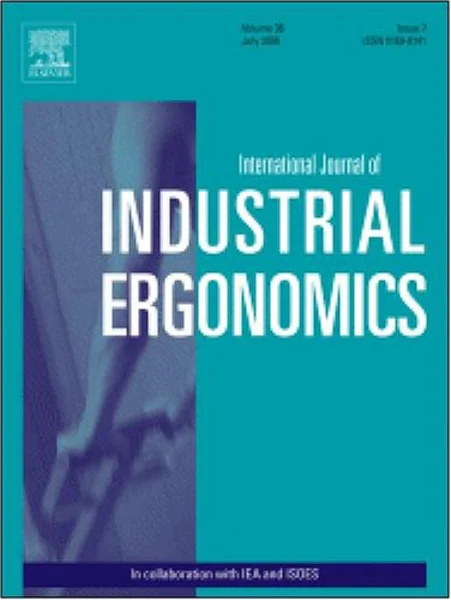-
participatory ergonomics: understanding the contributions of reflection groups in a hospital food service
جزئیات بیشتر مقاله- تاریخ ارائه: 1390/02/13
- تاریخ انتشار در تی پی بین: 1390/02/13
- تعداد بازدید: 425
- تعداد پرسش و پاسخ ها: 0
- شماره تماس دبیرخانه رویداد: -
aim to identify how the methodology of reflection groups (rg) can contribute to approach social-psychological problems, so often observed as obstacles in pe efforts. the objective was also to verify the contributions from rg to the implementation of ergonomics recommendations, which were a starting point and organized group discussions. method a concrete case was used as an illustration, and studied in depth: rg with administration and production workers’ representatives from the department of nutrition and dietetics of a cardiologic hospital in são paulo, brazil. rg are temporary thinking groups, taking place outside the workplace and having delegative and consultive participation. they make use of operative groups, an adapted form of tripartite group, activity as an instrumental resource, group dynamic techniques and videotaping. in 2007, 31 meetings took place during paid working hours with 7 groups of different composition, ranging from 1.5 h to 3 h. results additionally to the positive effects in communication and psychosocial environment, rg could also contribute to changes in interpersonal relationships, cooperation, personal and work behaviours. by dealing with aspects which could hinder the explicit task: fears, conflicts, and stereotyped beliefs and behaviours; resistance to change could be broken and group members could learn. rg allowed input about new risks; continuous information and feedback about ongoing ergonomics interventions so that immediate corrective action could be taken. the main form of participation was in administrative, organizational, and psychosocial problems which required a better clarification and identification of their real causes, commitment, and elaboration of strategies and negotiation of different stakeholders in their solution. conclusion rg takes advantage of homogeneous and heterogeneous groups, in face to face communication. the interactions in the groups are task-oriented (explicit task) but attaining groups’ goals depends on a relational interaction (implicit task). relevance to industry reflection groups can bring important contributions to ergonomics and industry because they favour the discussion, disclosure of problems and incorporation of solutions, enabling interventions in working organization, psychosocial environment and relationships in a collective and participatory approach, promoting health and social integration.
مقالات جدیدترین رویدادها
-
استفاده از تحلیل اهمیت-عملکرد در ارائه الگوی مدیریت خلاقیت سازمانی و ارائه راهکار جهت بهبود
-
بررسی تاثیر ارزش وجوه نقد مازاد بر ساختار سرمایه شرکت های پذیرفته شده در بورس اوراق بهادار تهران
-
بررسی تأثیر سطح افشای ریسک بر قرارداد بدهی شرکت های پذیرفته شده در بورس اوراق بهادار تهران
-
بررسی تأثیر رتبه بندی اعتباری مبتنی بر مدل امتیاز بازار نوظهور بر نقد شوندگی سهام با تأکید بر خصوصی سازی شرکت ها
-
تأثیر آمیخته بازاریابی پوشاک ایرانی بر تصویر ذهنی مشتری پوشاک ایرانی (هاکوپیان)
-
ارزیابی رابطه ژنتیکی بین گونه ای ارقام ( capsicum frutsicens و capsicum annuum ) با استفاده از نشانگر مولکولی issr
-
بررسی تاثیر تالک به همراه نانوسیلیس و میکروسیلیس بر بتن پودری واکنش پذیر
-
تحلیل و بررسی و مقایسه و تطبیق تزئینات شاه نشین در خانه های سنتی شهر اردبیل
-
چگونه توانستم اختلال در خواندن و نوشتن دانش آموزان راحله و مریم وامیر حسن را برطرف کنم
-
comparative performance evaluation of smes–smes, tcps–smes and sssc–smes controllers in automatic generation control for a two-area hydro–hydro system
مقالات جدیدترین ژورنال ها
-
مدیریت و بررسی افسردگی دانش آموزان دختر مقطع متوسطه دوم در دروان کرونا در شهرستان دزفول
-
مدیریت و بررسی خرد سیاسی در اندیشه ی فردوسی در ادب ایران
-
واکاوی و مدیریت توصیفی قلمدان(جاکلیدی)ضریح در موزه آستان قدس رضوی
-
بررسی تاثیر خلاقیت، دانش و انگیزه کارکنان بر پیشنهادات نوآورانه کارکنان ( مورد مطالعه: هتل های 3 و 4 ستاره استان کرمان)
-
بررسی تاثیر کیفیت سیستم های اطلاعاتی بر تصمیم گیری موفق در شرکتهای تولیدی استان اصفهان (مورد مطالعه: مدیران شرکتهای تولیدی استان اصفهان)
-
بازنمایی پوشاک دوره ساسانی، بر اساس مقایسه تطبیقی نقوش برجسته و ظروف
-
فراتحلیل مطالعات و تحقیقات رابطه بین فرهنگ سازمانی و رضایت شغلی
-
نانوکپسول های زیستی جهت جلوگیری از پوکی استخوان در فضانوردان در سفرهای فضایی
-
اجرای طرح آموزش و یادگیری آنلاین در مدارس استان اصفهان در دوران شیوع بیماری کووید-19
-
organization and design of city entrance with an emphasis on the space identity, case sample shiraz northern entrance




سوال خود را در مورد این مقاله مطرح نمایید :